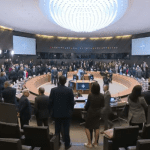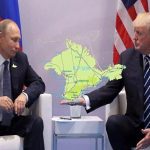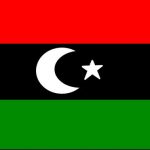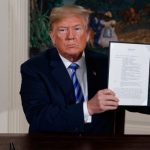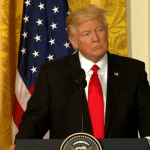Foreign ministers from the Group of Seven (G7) major democracies met on the Italian island of Capri on Wednesday for three days of discussions that were overshadowed by expectations of an Israeli retribution against Iran for missile and drone strikes.
The continued escalation of tensions between Israel and Iran, as well as the battles in Gaza and Ukraine, will dominate the agendas of ministers from the United States, the United Kingdom, France, Italy, Germany, Canada, and Japan.
Italy, which holds the G7’s rotating presidency, is pushing for a ceasefire in Gaza and a de-escalation of Middle East tensions, but Israel looks very likely to retaliate against Iran’s weekend attacks despite Western calls for restraint.
The G7 nations pledged support for Israel after the attack, which came in response to a presumed Israeli airstrike on Iran’s embassy compound in Damascus on April 1 which killed two generals and several other Iranian officers.
The U.S. said on Tuesday it was planning to impose new sanctions on Tehran’s missile and drone program in the coming days and expected its allies to follow suit. Tajani told Reuters this week that any sanctions might just focus on individuals.
The Iranian missiles and drones launched on Saturday were primarily shot down by Israel and its allies, resulting in no casualties. However, Israel claims it must retaliate to maintain the credibility of its deterrents. Iran says it considers the subject closed for the time being, but will retaliate if Israel does.
Russia’s invasion of Ukraine will also be a key topic in Capri, with Ukrainian Foreign Minister Dmytro Kuleba and NATO Secretary General Jens Stoltenberg set to attend the talks on Thursday.
Germany announced on Wednesday that G7 ministers would debate how to deliver stronger air defenses to Ukraine, as Kyiv confronts increased pressure from Russian air assaults on its electricity network.
Another crucial question will be how to use revenues from $300 billion in sovereign Russian assets held in the West to help Ukraine, despite concerns among certain European Union member states about the legality of such a move.
The meeting’s opening session on Wednesday evening will focus on Gaza and Iran, with the Red Sea situation being discussed on Thursday morning. Before turning to Ukraine, the ministers will consider how to boost ties with Africa.
The G7 ministers will also examine Indo-Pacific stability, according to Italy, as well as debate themes such as infrastructure connectivity, cybersecurity, artificial intelligence, and the battle against fake news.
Foreign ministers from the Group of Seven (G7) major democracies met on the Italian island of Capri on Wednesday for three days of discussions that were overshadowed by expectations of an Israeli retribution against Iran for missile and drone strikes.
The continued escalation of tensions between Israel and Iran, as well as the battles in Gaza and Ukraine, will dominate the agendas of ministers from the United States, the United Kingdom, France, Italy, Germany, Canada, and Japan.
Italy, which holds the G7’s rotating presidency, is pushing for a ceasefire in Gaza and a de-escalation of Middle East tensions, but Israel looks very likely to retaliate against Iran’s weekend attacks despite Western calls for restraint.
The G7 nations pledged support for Israel after the attack, which came in response to a presumed Israeli airstrike on Iran’s embassy compound in Damascus on April 1 which killed two generals and several other Iranian officers.
The U.S. said on Tuesday it was planning to impose new sanctions on Tehran’s missile and drone program in the coming days and expected its allies to follow suit. Tajani told Reuters this week that any sanctions might just focus on individuals.
The Iranian missiles and drones launched on Saturday were primarily shot down by Israel and its allies, resulting in no casualties. However, Israel claims it must retaliate to maintain the credibility of its deterrents. Iran says it considers the subject closed for the time being, but will retaliate if Israel does.
Russia’s invasion of Ukraine will also be a key topic in Capri, with Ukrainian Foreign Minister Dmytro Kuleba and NATO Secretary General Jens Stoltenberg set to attend the talks on Thursday.
Germany announced on Wednesday that G7 ministers would debate how to deliver stronger air defenses to Ukraine, as Kyiv confronts increased pressure from Russian air assaults on its electricity network.
Another crucial question will be how to use revenues from $300 billion in sovereign Russian assets held in the West to help Ukraine, despite concerns among certain European Union member states about the legality of such a move.
The meeting’s opening session on Wednesday evening will focus on Gaza and Iran, with the Red Sea situation being discussed on Thursday morning. Before turning to Ukraine, the ministers will consider how to boost ties with Africa.
The G7 ministers will also examine Indo-Pacific stability, according to Italy, as well as debate themes such as infrastructure connectivity, cybersecurity, artificial intelligence, and the battle against fake news.
Foreign ministers from the Group of Seven (G7) major democracies met on the Italian island of Capri on Wednesday for three days of discussions that were overshadowed by expectations of an Israeli retribution against Iran for missile and drone strikes.
The continued escalation of tensions between Israel and Iran, as well as the battles in Gaza and Ukraine, will dominate the agendas of ministers from the United States, the United Kingdom, France, Italy, Germany, Canada, and Japan.
Italy, which holds the G7’s rotating presidency, is pushing for a ceasefire in Gaza and a de-escalation of Middle East tensions, but Israel looks very likely to retaliate against Iran’s weekend attacks despite Western calls for restraint.
The G7 nations pledged support for Israel after the attack, which came in response to a presumed Israeli airstrike on Iran’s embassy compound in Damascus on April 1 which killed two generals and several other Iranian officers.
The U.S. said on Tuesday it was planning to impose new sanctions on Tehran’s missile and drone program in the coming days and expected its allies to follow suit. Tajani told Reuters this week that any sanctions might just focus on individuals.
The Iranian missiles and drones launched on Saturday were primarily shot down by Israel and its allies, resulting in no casualties. However, Israel claims it must retaliate to maintain the credibility of its deterrents. Iran says it considers the subject closed for the time being, but will retaliate if Israel does.
Russia’s invasion of Ukraine will also be a key topic in Capri, with Ukrainian Foreign Minister Dmytro Kuleba and NATO Secretary General Jens Stoltenberg set to attend the talks on Thursday.
Germany announced on Wednesday that G7 ministers would debate how to deliver stronger air defenses to Ukraine, as Kyiv confronts increased pressure from Russian air assaults on its electricity network.
Another crucial question will be how to use revenues from $300 billion in sovereign Russian assets held in the West to help Ukraine, despite concerns among certain European Union member states about the legality of such a move.
The meeting’s opening session on Wednesday evening will focus on Gaza and Iran, with the Red Sea situation being discussed on Thursday morning. Before turning to Ukraine, the ministers will consider how to boost ties with Africa.
The G7 ministers will also examine Indo-Pacific stability, according to Italy, as well as debate themes such as infrastructure connectivity, cybersecurity, artificial intelligence, and the battle against fake news.
Foreign ministers from the Group of Seven (G7) major democracies met on the Italian island of Capri on Wednesday for three days of discussions that were overshadowed by expectations of an Israeli retribution against Iran for missile and drone strikes.
The continued escalation of tensions between Israel and Iran, as well as the battles in Gaza and Ukraine, will dominate the agendas of ministers from the United States, the United Kingdom, France, Italy, Germany, Canada, and Japan.
Italy, which holds the G7’s rotating presidency, is pushing for a ceasefire in Gaza and a de-escalation of Middle East tensions, but Israel looks very likely to retaliate against Iran’s weekend attacks despite Western calls for restraint.
The G7 nations pledged support for Israel after the attack, which came in response to a presumed Israeli airstrike on Iran’s embassy compound in Damascus on April 1 which killed two generals and several other Iranian officers.
The U.S. said on Tuesday it was planning to impose new sanctions on Tehran’s missile and drone program in the coming days and expected its allies to follow suit. Tajani told Reuters this week that any sanctions might just focus on individuals.
The Iranian missiles and drones launched on Saturday were primarily shot down by Israel and its allies, resulting in no casualties. However, Israel claims it must retaliate to maintain the credibility of its deterrents. Iran says it considers the subject closed for the time being, but will retaliate if Israel does.
Russia’s invasion of Ukraine will also be a key topic in Capri, with Ukrainian Foreign Minister Dmytro Kuleba and NATO Secretary General Jens Stoltenberg set to attend the talks on Thursday.
Germany announced on Wednesday that G7 ministers would debate how to deliver stronger air defenses to Ukraine, as Kyiv confronts increased pressure from Russian air assaults on its electricity network.
Another crucial question will be how to use revenues from $300 billion in sovereign Russian assets held in the West to help Ukraine, despite concerns among certain European Union member states about the legality of such a move.
The meeting’s opening session on Wednesday evening will focus on Gaza and Iran, with the Red Sea situation being discussed on Thursday morning. Before turning to Ukraine, the ministers will consider how to boost ties with Africa.
The G7 ministers will also examine Indo-Pacific stability, according to Italy, as well as debate themes such as infrastructure connectivity, cybersecurity, artificial intelligence, and the battle against fake news.
Foreign ministers from the Group of Seven (G7) major democracies met on the Italian island of Capri on Wednesday for three days of discussions that were overshadowed by expectations of an Israeli retribution against Iran for missile and drone strikes.
The continued escalation of tensions between Israel and Iran, as well as the battles in Gaza and Ukraine, will dominate the agendas of ministers from the United States, the United Kingdom, France, Italy, Germany, Canada, and Japan.
Italy, which holds the G7’s rotating presidency, is pushing for a ceasefire in Gaza and a de-escalation of Middle East tensions, but Israel looks very likely to retaliate against Iran’s weekend attacks despite Western calls for restraint.
The G7 nations pledged support for Israel after the attack, which came in response to a presumed Israeli airstrike on Iran’s embassy compound in Damascus on April 1 which killed two generals and several other Iranian officers.
The U.S. said on Tuesday it was planning to impose new sanctions on Tehran’s missile and drone program in the coming days and expected its allies to follow suit. Tajani told Reuters this week that any sanctions might just focus on individuals.
The Iranian missiles and drones launched on Saturday were primarily shot down by Israel and its allies, resulting in no casualties. However, Israel claims it must retaliate to maintain the credibility of its deterrents. Iran says it considers the subject closed for the time being, but will retaliate if Israel does.
Russia’s invasion of Ukraine will also be a key topic in Capri, with Ukrainian Foreign Minister Dmytro Kuleba and NATO Secretary General Jens Stoltenberg set to attend the talks on Thursday.
Germany announced on Wednesday that G7 ministers would debate how to deliver stronger air defenses to Ukraine, as Kyiv confronts increased pressure from Russian air assaults on its electricity network.
Another crucial question will be how to use revenues from $300 billion in sovereign Russian assets held in the West to help Ukraine, despite concerns among certain European Union member states about the legality of such a move.
The meeting’s opening session on Wednesday evening will focus on Gaza and Iran, with the Red Sea situation being discussed on Thursday morning. Before turning to Ukraine, the ministers will consider how to boost ties with Africa.
The G7 ministers will also examine Indo-Pacific stability, according to Italy, as well as debate themes such as infrastructure connectivity, cybersecurity, artificial intelligence, and the battle against fake news.
Foreign ministers from the Group of Seven (G7) major democracies met on the Italian island of Capri on Wednesday for three days of discussions that were overshadowed by expectations of an Israeli retribution against Iran for missile and drone strikes.
The continued escalation of tensions between Israel and Iran, as well as the battles in Gaza and Ukraine, will dominate the agendas of ministers from the United States, the United Kingdom, France, Italy, Germany, Canada, and Japan.
Italy, which holds the G7’s rotating presidency, is pushing for a ceasefire in Gaza and a de-escalation of Middle East tensions, but Israel looks very likely to retaliate against Iran’s weekend attacks despite Western calls for restraint.
The G7 nations pledged support for Israel after the attack, which came in response to a presumed Israeli airstrike on Iran’s embassy compound in Damascus on April 1 which killed two generals and several other Iranian officers.
The U.S. said on Tuesday it was planning to impose new sanctions on Tehran’s missile and drone program in the coming days and expected its allies to follow suit. Tajani told Reuters this week that any sanctions might just focus on individuals.
The Iranian missiles and drones launched on Saturday were primarily shot down by Israel and its allies, resulting in no casualties. However, Israel claims it must retaliate to maintain the credibility of its deterrents. Iran says it considers the subject closed for the time being, but will retaliate if Israel does.
Russia’s invasion of Ukraine will also be a key topic in Capri, with Ukrainian Foreign Minister Dmytro Kuleba and NATO Secretary General Jens Stoltenberg set to attend the talks on Thursday.
Germany announced on Wednesday that G7 ministers would debate how to deliver stronger air defenses to Ukraine, as Kyiv confronts increased pressure from Russian air assaults on its electricity network.
Another crucial question will be how to use revenues from $300 billion in sovereign Russian assets held in the West to help Ukraine, despite concerns among certain European Union member states about the legality of such a move.
The meeting’s opening session on Wednesday evening will focus on Gaza and Iran, with the Red Sea situation being discussed on Thursday morning. Before turning to Ukraine, the ministers will consider how to boost ties with Africa.
The G7 ministers will also examine Indo-Pacific stability, according to Italy, as well as debate themes such as infrastructure connectivity, cybersecurity, artificial intelligence, and the battle against fake news.
Foreign ministers from the Group of Seven (G7) major democracies met on the Italian island of Capri on Wednesday for three days of discussions that were overshadowed by expectations of an Israeli retribution against Iran for missile and drone strikes.
The continued escalation of tensions between Israel and Iran, as well as the battles in Gaza and Ukraine, will dominate the agendas of ministers from the United States, the United Kingdom, France, Italy, Germany, Canada, and Japan.
Italy, which holds the G7’s rotating presidency, is pushing for a ceasefire in Gaza and a de-escalation of Middle East tensions, but Israel looks very likely to retaliate against Iran’s weekend attacks despite Western calls for restraint.
The G7 nations pledged support for Israel after the attack, which came in response to a presumed Israeli airstrike on Iran’s embassy compound in Damascus on April 1 which killed two generals and several other Iranian officers.
The U.S. said on Tuesday it was planning to impose new sanctions on Tehran’s missile and drone program in the coming days and expected its allies to follow suit. Tajani told Reuters this week that any sanctions might just focus on individuals.
The Iranian missiles and drones launched on Saturday were primarily shot down by Israel and its allies, resulting in no casualties. However, Israel claims it must retaliate to maintain the credibility of its deterrents. Iran says it considers the subject closed for the time being, but will retaliate if Israel does.
Russia’s invasion of Ukraine will also be a key topic in Capri, with Ukrainian Foreign Minister Dmytro Kuleba and NATO Secretary General Jens Stoltenberg set to attend the talks on Thursday.
Germany announced on Wednesday that G7 ministers would debate how to deliver stronger air defenses to Ukraine, as Kyiv confronts increased pressure from Russian air assaults on its electricity network.
Another crucial question will be how to use revenues from $300 billion in sovereign Russian assets held in the West to help Ukraine, despite concerns among certain European Union member states about the legality of such a move.
The meeting’s opening session on Wednesday evening will focus on Gaza and Iran, with the Red Sea situation being discussed on Thursday morning. Before turning to Ukraine, the ministers will consider how to boost ties with Africa.
The G7 ministers will also examine Indo-Pacific stability, according to Italy, as well as debate themes such as infrastructure connectivity, cybersecurity, artificial intelligence, and the battle against fake news.
Foreign ministers from the Group of Seven (G7) major democracies met on the Italian island of Capri on Wednesday for three days of discussions that were overshadowed by expectations of an Israeli retribution against Iran for missile and drone strikes.
The continued escalation of tensions between Israel and Iran, as well as the battles in Gaza and Ukraine, will dominate the agendas of ministers from the United States, the United Kingdom, France, Italy, Germany, Canada, and Japan.
Italy, which holds the G7’s rotating presidency, is pushing for a ceasefire in Gaza and a de-escalation of Middle East tensions, but Israel looks very likely to retaliate against Iran’s weekend attacks despite Western calls for restraint.
The G7 nations pledged support for Israel after the attack, which came in response to a presumed Israeli airstrike on Iran’s embassy compound in Damascus on April 1 which killed two generals and several other Iranian officers.
The U.S. said on Tuesday it was planning to impose new sanctions on Tehran’s missile and drone program in the coming days and expected its allies to follow suit. Tajani told Reuters this week that any sanctions might just focus on individuals.
The Iranian missiles and drones launched on Saturday were primarily shot down by Israel and its allies, resulting in no casualties. However, Israel claims it must retaliate to maintain the credibility of its deterrents. Iran says it considers the subject closed for the time being, but will retaliate if Israel does.
Russia’s invasion of Ukraine will also be a key topic in Capri, with Ukrainian Foreign Minister Dmytro Kuleba and NATO Secretary General Jens Stoltenberg set to attend the talks on Thursday.
Germany announced on Wednesday that G7 ministers would debate how to deliver stronger air defenses to Ukraine, as Kyiv confronts increased pressure from Russian air assaults on its electricity network.
Another crucial question will be how to use revenues from $300 billion in sovereign Russian assets held in the West to help Ukraine, despite concerns among certain European Union member states about the legality of such a move.
The meeting’s opening session on Wednesday evening will focus on Gaza and Iran, with the Red Sea situation being discussed on Thursday morning. Before turning to Ukraine, the ministers will consider how to boost ties with Africa.
The G7 ministers will also examine Indo-Pacific stability, according to Italy, as well as debate themes such as infrastructure connectivity, cybersecurity, artificial intelligence, and the battle against fake news.



